 And so it has happened, after the threats and shadow boxing, Russia have acted on their word and shut off the flow of gas to Ukraine.
And so it has happened, after the threats and shadow boxing, Russia have acted on their word and shut off the flow of gas to Ukraine.
Against a military backdrop and allegations of funding of opponents of fracking, it’s a busy time for the former soviet oil and gas industries.
Clearly what the Kremlin see as the biggest threat to their gas market dominance is not threatened sanctions and EU displeasure but the dawning of a new energy era. A strange time then to create disruption and reputational damage for their critical economic driver.
The official, de-politicised, reason for the switch off of gas supplies to Ukraine is that a £2.6bn debt is owed to Gazprom, the Russian state energy giant and that any ‘reasonable’ business would do the same in the circumstances.
Gazprom spokesperson Sergei Kupriyanov pointedly said:
“Gazprom supplies to Ukraine only the amount that has been paid for, and the amount that has been paid for is zero”
The Ukrainian Prime Minister, Arseniy Yatsenyuk, however countered the Gazprom and Russian claims saying:
“It is not about gas – it is a general Russian plan to destroy Ukraine.”
“It is yet another step against the Ukrainian state and against Ukrainian independence.”
Whatever the true reason for the action and most external viewers have sympathy with the Ukrainian explanation, the outcome and impact on the European energy markets is the same.
Not only is Ukraine a major buyer (but not allegedly payer) of Russian gas, their geography means they are a key transportation route for Russian gas supplies destined for central Europe.
Although other routes are in the ‘pipeline’ they are too far away to provide a much needed alternative and cool the jitters in the market. Indeed Putin himself has openly challenged the EU leaders to persuade Ukraine to play ball or face the consequences of severe pressure on gas supplies to continental Europe.
In a worrying portent for the future, Alexei Miller, Chief Executive of Gazprom said:
“Regarding transit risks, they exist and they are not insignificant”
Whilst the numbers differ by country, overall the EU’s energy needs are reliant on Russia to the tune of 30%, with some eastern European nations importing 80% or more. The UK is largely a Russian gas free zone however the existence of the interconnector between the UK and Belgium and the commercial incentives that could see the transfer of UK sourced gas to energy starved Continental Europe may be too attractive to ignore.
In simple terms, the shortages caused by actions on the Russian border could impact the energy market of our little island in the North Sea.
Indeed Ukrainian Energy Minister Yuriy Prodan claimed that even though Ukraine had used foresight to store 14 billion cubic meters of gas, enough to support their needs until the end of 2014, they would still need to supplement the existing supplies with deliveries from its western European neighbours
The impact was immediate with the ICE (Continental Europe) July natural gas contract rising 6.2 per cent to 44.45p a therm, on fears of a “gas war”.
With Russia’s fear of Shale, and an economy dependent on their oil and gas industries, the stakes are incredibly high for not only for Ukraine but the whole European energy market.
